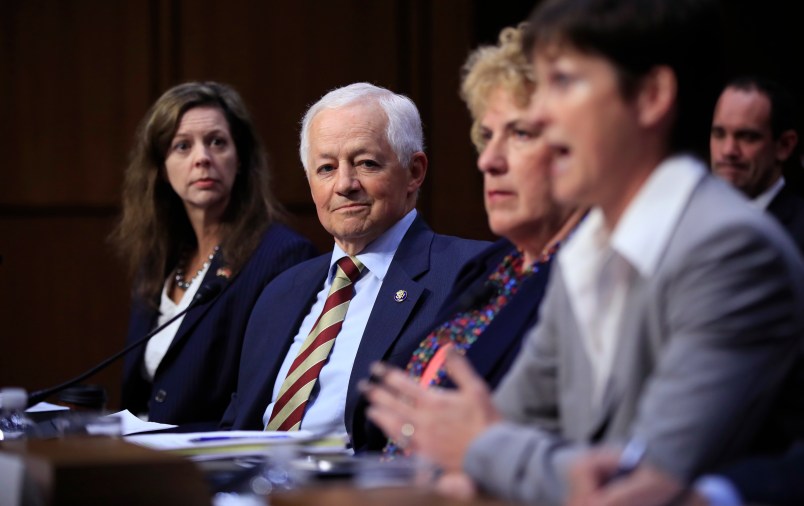At this Congress’s first bipartisan public hearing on health care reform, after a year of Republicans drafting bills behind closed doors, health insurance commissioners from across the country testified to senators that the Trump administration’s multi-pronged sabotage of the Affordable Care Act is driving up rates and sowing uncertainty in their states.
“The narrative that the ACA is failing and imploding is just false,” Teresa Miller, the Pennsylvania insurance commissioner, told the Senate Health, Labor, Education and Pensions (HELP) committee hearing Wednesday. Instead, she emphasized, the Trump administration’s rollback of outreach, threats to end payments to insurers, and mixed messages on enforcement of the individual mandate is throwing the country into chaos.
“I cannot stress enough how difficult that uncertainty is on our markets,” she said.
The commissioners pleaded with lawmakers to send federal aid in the form of guaranteed funding for Obamacare’s cost-sharing reduction payments (CSRs) for multiple years, creating a federal reinsurance program, and restoring funding to the Obamacare navigators and ad campaigns recently gutted by the Trump administration.
Some members of the committee seemed eager to meet these demands.
“President Trump is working to actively sabotage our health care system. It’s petty and it’s going to hurt millions of people,” said Sen. Elizabeth Warren (D-MA). “If he’s not going to stop, Congress should stop him.”
Here are the ways the commissioners said the Trump administration’s actions are roiling their state health insurance markets:
Subsidies up in the air
From her first turn at the microphone, Tennessee’s insurance commissioner Julie Mix McPeak tore into the Trump administration for its monthly dance around making billions in CSR payments to insurers, which she said has caused insurers to set their rates at least 14 percent higher based on an assumption the payments could be cut off next year.
“Tennessee has continued to see health insurance carriers flee the market due to the tremendous uncertainty surrounding the 2018 plan year,” she said. “Our consumers have seen their premium costs skyrocket and their plan choices diminished.”
Washington State Insurance Commissioner Mike Kreidler agreed, and pleaded with the committee to pass a bill that appropriates at least two years of CSR funding, taking that particular grenade out of Trump’s hands.
“The CSRs are number one, in terms of what you can do immediately,” he said. “We have got to get away from funding it on an month-by-month basis, or even a year-to-year basis.”
Though senior Senate Republicans have been discussing a bill that guarantees one year of CSR payments, House Republicans, including the leader of the hard-right Freedom Caucus, have signaled a willingness to make three years of payments to give the market greater stability.
Navigators slashed in half
Multiple state insurance commissioners testified that their states will also be severely hurt by the Trump administration’s decision to slash in half the funding for navigators who work in-person with people across the country to get them signed up for health insurance.
“We are concerned it will have a major impact on our enrollment,”Alaska’s Division of Insurance Director Lori Wing-Heier said. “We rely on our clinics and navigators to explain benefits and enrollment to people living in rural Alaska. This will be devastating to our population who need to know what their options are and understanding basic things like the dates of enrollment.”
Wing-Heier added that navigators in her state can speak the many native languages of Alaska’s population, and she fears they would no longer get that information if the program is gutted.
Gutted outreach budget
State regulators blasted the Trump administration’s decision to cut 90 percent of what was spent last year informing the public about open enrollment, saying it would lead to a sicker, more expensive risk pool that ultimately costs the government much more.
“You want to encourage the people least likely to sign up to sign up,” said Kreidler. That way they don’t become the free riders in our system seeking uncompensated emergency room to take care of themselves. The more outreach, the better it is for all of us.”
Out of five states who testified, only Oklahoma’s insurance commissioner John Doke questioned the need for federal spending on outreach, noting that in his state, the insurance companies themselves “advertise at every football game.”
Sen. Al Franken (D-MN) quipped that Doke comment merely proves that “advertising works,” since the companies “are not stupid” to make that investment.
Mandate uncertainty
Teresa Miller, the Pennsylvania’s insurance commissioner, said the Trump administration’s mixed messages about whether it will enforce Obamacare’s individual mandate—imposing a tax penalty on those who go without insurance—are also driving up costs.
“We’re very concerned about the enforcement of the mandate,” she said. “There’s a lot of concern we hear from our insurers in Pennsylvania that because they’re not sure how effective the mandate will be going forward, because of all the conversations about eliminating it, we’re going to see that uncertainty built into insurance rates.”
While “mandates are not perfect,” she said, “I have not seen a better system for getting young and health people to sign up for insurance.”










